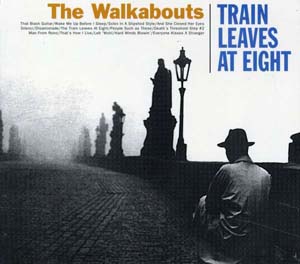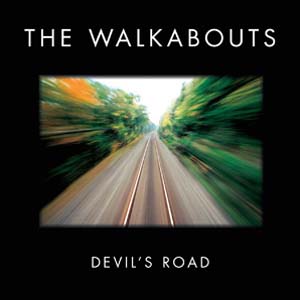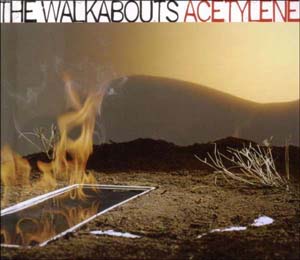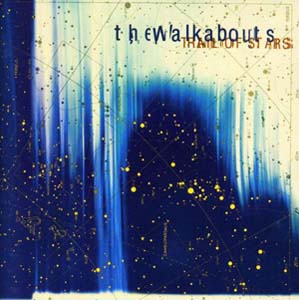|
Warenkorb / Shopping Cart:
Artikel 0,00 €      |

|
|
Suche / Search
|
|
STOPPOK |
|
VORVERKAUF |
|
# |
|
# |
|
|
|
Keep an eye on...
DAMAGED GOODS |
|
ON THE DEcKS |
|
ON THE DECKS |
|
OBS 28 |
|
WIEDER DA! |
|
|
|
----- |
|
SUPER SAMPLER |
|
50s/60s R'n'B |
|
|
|
|
|
GESCHENK |
|
|
|
|
|
|
|
|
|
|

|
|
||||||||||||||||
Als Chris und Carla uns im Herbst `99 von der Idee erzählten, ein Nachfolgealbum des semi-akustischen Coveralbums „Satisfied Mind“ aufzunehmen, da waren wir schier aus dem Häuschen. Denn „Satisfied Mind“ ist nicht nur in meinen persönlichen Charts ganz oben, sondern erfreut sich auch bei Kritikern und Fans allergrößter Beliebtheit.Ihre Idee war nun noch etwas spezieller, denn sie wollten weder amerikanische noch britische Songs als Vorlage benutzen, sondern nur kontinental -europäisches Liedgut in Erwägung ziehen. Da die Band durch jahrelanges touren in allen Ecken Europas ihre Freunde hat, dauerte es nicht lange, bis aus jedem Land eine Cassette mit Material zur Sichtung zur Verfügung stand.Nach einigen Wochen hatte sich die Band auf 15 Songs geeinigt, von denen 14 den Weg auf die CD fanden (das Outtake reichen wir bei der nächsten Out Of the Blue nach). Und es ist ein ganz wundervolles Album geworden, mit einfach unglaublicher Wohlfühl-Wachstumsrate.
Die europäische Reise ist in South und North unterteilt, wobei der Süden eher zufällig älteres Ursprungsmaterial enthält und die Songs des Nordens fast alle relativ neu sind. Dabei wurden die Texte ins englische übersetzt und die Musik Walkaboutisiert, sprich man wollte zwar das Originalfeeling beibehalten, den Songs aber auch arrangieren und interpretieren.
Die CD kommt zudem in einem wunderschönen, sehr stilsicheren Digipak.Im englischen Teil erfahrt Ihr alles über die Albumbesetzung, das Konzept und Song-für-Song-Kommentare. Alles von Chris Eckman selbst...“Bewahren die Integrität der Originale, fügen Neues hinzu und bleiben trotzdem dem Walkabouts-Stil treu. Besser kann man sowas nicht machen.“ (Intro)„So fantastisch, homogen, so viel mehr als seine Einzelteile, dass dieser emotionale Tiefgang in diesem Jahrgang bislang seinesgleichen sucht.“ (Süddeutsche Zeitung)„Gewagt, aber gelungen. Und beweist: Schwermut ist international.“ (Kulturspiegel)„Wunderbarer Walkabouts-Stil: lakonischer, atmosphärischer Folkpop in Zeitlupe mit dem man dem Tag gelassener begegnet.“ (Brigitte)
Herstellerinformationen
Glitterhouse Records GmbH
Schlachthofstr. 36a
21079 Hamburg
Deutschland
www.glitterhouse.com
"Train Leaves At Eight" is an inbetween project, a concept album which will remind you of "Satisfied Mind", another inbetween album with cover versions that became one of the most critically acclaimed recordings in the long career of this band. This time they´ve taken their favourite European songs, from Greece to Portugal, from the Netherlands to Serbia, from Portugal to England to Germany to Slovenia to...
Please read below for recording and background info written by Chris Eckman himself:
Chris Eckman: vocals, guitar, piano, harmonium
Carla Torgerson: vocals, guitars, piano, melodica
Glenn Slater: piano, organ, synthesizers
The new Walkabouts rhythm section:
Joe Skyward: bass: (The Posies, Sunny Day Real Estate)
Brian Young: drums, percussion (The Posies, Fountains Of Wayne)
The guest musicians:
Elaine Di Falco: accordion: (Delta Flora, The Walkabouts)
Anne Marie Ruljancich: violin: (Gary Heffern, Chris & Carla, Chris Eckman solo album)
Christine Gunn: cello (Walkabouts, Chris & Carla)
Scott McCaughey: vibes, bass harmonica (R.E.M., Minus Five, Young Fresh Fellows)
Peter Buck: Bouzouki, mandolin, nyckelharpa (R.E.M., Minus Five)
Dan Tyack: pedal steel (Asleep At The Wheel)
Steve Berlin: saxaphone, flute (Los Lobos)
Danny Barnes: banjo (Bad Livers)
Robin Holcomb: vocals (acclaimed songwriter/pianist - has done 3 solo albums for Elektra)
Produced by The Walkabouts & Kevin Suggs at Litho and Avast!, Seattle, March 2000
Engineered by Kevin Suggs
The album:
Another name for this album might have been: Songs From Continental Europe. That is the place these songs call home. That is the abstraction from which they are born. However, that title would sorely miss the point of this project. This album is not a destination; it is an unfinished, personal journey. It is a quick flare across borders; both imagined and sturdy. It is the faint sound of the train as it turns the corner, away from well-worn landmarks and cultural filing cabinets. This album is a sequence of questions: Why do the trains keep stopping at the same stations? Why do our musical stories seem to travel in only one direction? Why does our luggage seem so worn, when we actually go nowhere? In the end, the only map one needs is the songs themselves. These songs came to us over a period of years. Some arrived in unmarked parcels, some were heard crackling in the night air. Some of them were rumours and some of them were promises fulfilled. All of them came to us shellacked with coincidence and kindness. We certainly must thank the songwriters, the song-givers, the generous musicians, the recordists, and the translators for helping us to pull this album together. Without them, we would still be waiting for the same old train.
- Chris Eckman, Seattle, March 19, 2000
The songs:
1. The Train Leaves At Eight
This song by Mikis Theodorakis was found on a beat up cassette I had laying around the house. It turns out that most versions of this song have lyrics, but for some reason the version I discovered didn't. Theodorakis is one of Greece's most famous musical artists.He is known for his songs, his classical compositions and his film scores. He is also a man of political convictions who actively opposed the Greek military government in the late 60's, and continues to engage in political dialogue today.
2. Man From Reno
This song was found on a collection of film music by Bosnian born composer Goran Bregovic. Bregovic has done collaborations with rock artists like Iggy Pop, and is probably best known for his movie scores ("Arizona Dream", "Time Of The Gypsies."). "Man From Reno," is a collaboration with American born cult figure, Scott Walker. Walker is one of my all-time favorite vocalists and he is probably the most "European" American songwriter ever. Walker is heavily influenced by Jacques Brel, 19th century classical music, Bergman movies and existentialism.
3. That Black Guitar
A nostalgic lament written by the Slovenian "Bob Dylan", Vlado Kreslin."That Black Guitar" deals with the plight of the Gypsies in the region of Slovenia that Kreslin is from. Kreslin is immensely
popular in Slovenia. His songs have been used as the basis for novels and films. Scott McCaughey (R.E.M., Minus Five) introduced me to his music, having discovered Kreslin's music when he opened for R.E.M. this past summer in Slovenia. Vlado often performs with both a rock band, and a folk band consisting of players all over the age of sixty, simultaneously. You should hear their version of Iggy Pop's "Passenger!"
4. Disamistade
This song is by the sadly deceased Italian artist Fabrizio De Andre. It comes from De Andre's final album "Animie." The lyrics are a powerful dissection of family, power and corruption. When I first heard De Andre's music I was reminded of Leonard Cohen's narrative authority. I was not surprised to discover that De Andre often covered Cohen's work in the early stages of his career. De Andre was an outspoken advocate of the political left, and also spent a year imprisoned by terrorists on the island of Sardinia.
5. Silenci
This song is written by the Spanish composer Lluis Llach. Llach comes from the Catalan region of Spain, and often sings in the Catalan language. The song "Silenci" deals directly with the censorship struggles he had with the Franco regime. This song came to me in the mail. It was sent by friends in Spain. I was not familiar with Llach's work, but when I heard the arrangements, I again thought of Leonard Cohen. Of course it is clear that Cohen was as much influenced by European songwriters as they have been by him. I have read interviews with Cohen where his cites Jacques Brel and the fabulous Portuguese singer Amalia as inspirations for his work. It should be noted that Lluis Llach wrote a song called "April 74" which was as song of solidarity for the Portuguese revolution.
6. Hard Winds Blowin'
This song is written by the Portuguese songwriter Jose Maria Branco and his wife Manuela De Freitas. Maria Branco was one of Portugal's most important songwriters in the countries struggle against fascism in the early 1970s. He continues to perform, record and produce albums today. I discovered the song on the album "Na Linha Da Vida," by the contemporary fado artist Camane. Maria was also the producer of that highly recommended album.
7. Everyone Kisses A Stranger
A song from one of the most realized debut albums I have heard in years. The artist is the French singer-songwriter, Francoiz Breut. This album was given to Carla and I by a German friend of ours, who had seen her play in a small club in Strasbourg. The album is a collaboration with her husband, the well-known French artist Dominique A. The sound is both earthbound and a look to the future. The sound of the album was a big influence on the Chris And Carla album "Swinger 500." While still basically unknown outside her native France, Francoiz Breut's talents have been championed by artists such as Howe Gelb, Calexico and Edith Frost.
8. People Such As These (Ces Gens-la)
This song is Jacques Brel's full frontal assault on his bourgeoisie upbringing. Brel of course is one of Europe's most internationally recognized songwriters. His songs have been covered by countless artists (Scott Walker did an entire album of his songs) and there has even been a Broadway musical based on his works. Brel was born in Flemish Belgium, but reached fame in the music halls of Paris. Uncompromising and singular, Brel helped redefine the power of the popular song.
9. Wake Me Up Before I Sleep
The final track on the Belgian band Deus' second album, this is one of my all time favorite three in the morning songs. We met Deus in 1993 when they opened for us in their native Antwerp. It was one of those opening sets that you felt lucky to have witnessed. A year later, at the same club, Tom Barman brought us a tape of their just completed debut. All the promise of that earlier set had been captured. We have remained fans ever since.
10. Solex In A Slipshod Style
The Dutch artist Solex, is a musical scavenger. Her entire debut album (from which this song is taken) is supposedly made up of samples from obscure records found in used vinyl shop below her flat. We were intrigued about actually learning to "play" such a song. Also, Carla wanted desperately to sing the words "slipshod" and "slaphappy."
11. That's How I Live (So Lebe Ich)
The Hamburg based band, Blumfeld, included this song on their third album "Old Nobody." Blumfeld are an ever evolving project whose earlier, icy, post-punk sound has been abandoned in favor of melodic pop songs. Jochen Distelmeyer's lyrics however, remain dense and multi-layered. We met Jochen in 1992 at a festival in Germany. A few months later we were in Hamburg and he came backstage to say hello. He gave us a tape of young German artists who sang only in German. On that tape was Tillman Rossmy's "Loswerden", a song we ended up covering some years later.
12. And She Closed Her Eyes
This is the title track from Swedish songwriter, Stina Nordenstam's debut album. Nordenstam is the most personal of singers.Her songs are whispered as much as they are sung. Stina released a unique and cryptic album of covers in 1999. On that album, she quietly assails the original songs and leaves behind only traces and essences. That work was without doubt, a guidepost for the "Train Leaves At Eight."
13. Death's Threshold Step #2
A sweeping song, by Al Bystrom, the songwriter for the Norwegian band Midnight Choir. The Walkabouts have had a privileged view into the heart of this band. I have produced their last three albums and Carla, Terri and Glenn have all been invited to appear on one or more of the albums. Obviously I am close to these guys, but in spite of having worked countless hours, surrounded by their music, I find that I am still compelled to seek out their songs. Midnight Choir make powerful, northern soul music.
14. Leb'Wohl
This ambient ballad by the "Krautrock" band Neu!, was the logical finale for our album. I remember many nights of partying in the mid-eightes that ended with the black covered "Neu! 75" album being placed on the turntable. Truly one of the most sublime chillout albums I know. I also remember sleeping in one of the bedrooms at the Conny Plank studio while we were recording "Devil's Road," and seeing Neu! master tapes up on the shelf. One drunken night we almost persuaded the engineer to put them onto the tape machine so that we could give them a listen. I wish he had.

Walkabouts2-LP (+2-CD) Devil's Road (DeLuxe Edition)Nicht verfügbar
|

Walkabouts6-LP (+4-CD) Feel Like Going Home: Cover AlbumsNicht verfügbar
|

Walkabouts2-LP+CD Berlin (180g)Nicht verfügbar
|

WalkaboutsCD Acetylene
8,95 €
|

WalkaboutsCD Satisfied Mind
9,95 €
|

WalkaboutsCD Trail Of Stars
8,95 €
|

